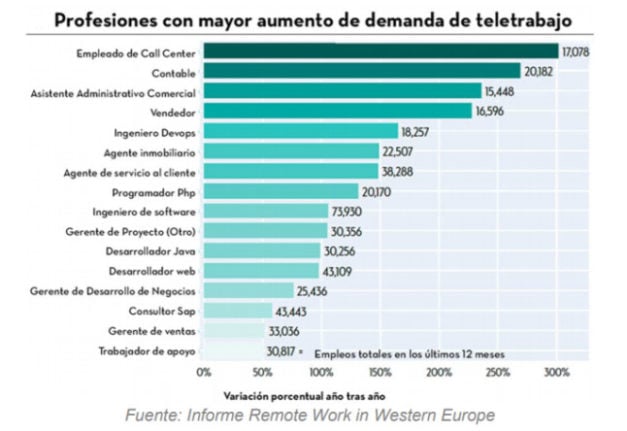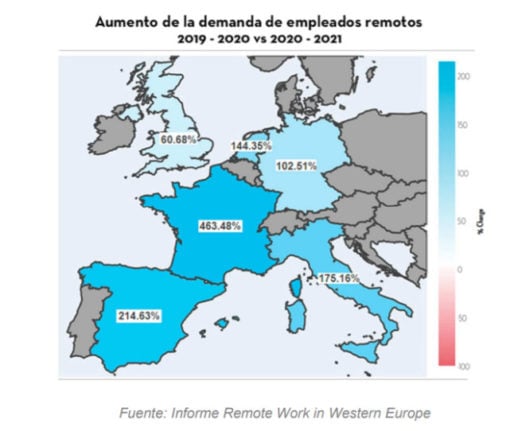Will remote working become the norm in Spain after the Covid-19 pandemic?

The number of job vacancies in Spain which involve working from home has risen by more than 200 percent, with experts suggesting it’s a “structural change that’s here to stay”. But will Spain really become a nation of remote workers after Covid?
From May 2020 to April 2021, the number of jobs advertised online in Spain which included the option of remote working increased by 214 percent, according to the latest study by Adecco, “Remote Work in Western Europe”.
"People want to work remotely and companies are responding to this demand by making remote work opportunities clear in their job offers," Adecco reported.
The trend was particularly marked in central and western areas of Spain, but all fifty provinces except Soria have recorded an increase in this kind of job listings.
The jobs which have seen the biggest rise in remote work offers are call centre positions, in accounting, admin, real estate and various IT roles.

The study - which analysed data for Spain, Germany, the Netherlands, France, the United Kingdom and Italy - found that the increase in offers was more pronounced in Spain than the average rise in Western Europe of 126 percent, although France recorded the biggest hike in teleworking offers with a 463 percent increase.

“The pandemic has accelerated a change that was already in force,” Adecco contended based on the fact that remote working vacancies were already on the rise in 2019.
Are Spanish employers really looking to employ remote workers?
As a result of the full lockdown in March 2020, the total number of people in Spain who worked at least occasionally from home doubled, exceeding 3.5 million people.
That represented around 16 percent of Spain’s working population, but Adecco estimates that approximately 36 percent of jobs on the market could be carried out entirely remotely.
In the second term of 2021, around 9.4 percent of employed people in Spain (1.8 million people) worked from home at least half of their weekly work hours.
Fluctuations aside, one important stat to keep in mind is that despite the big rise in Spanish job vacancies offering remote working options, they still only represent 0.3 percent of the total.
On average across Western Europe, jobs involving work from home account for 12 percent of total vacancies, so Spain still has a very long way to go.
According to Javier Blasco, director of Spain’s Adecco Group Institute, the difference lies in the fact that the productive fabric of other countries is much more geared towards teleworking and, compared to very advanced economies centred around telecommunications or banking, Spain's economy is mainly service based.
“The Spanish economy is very much based on the face-to-face model and in recent months the sectors that have grown the most in employment are education, health, transport ... there are few possibilities of working from home,” Blasco told El País.
“It’s not better or worse, it’s simply that in Spain there is a very strong face-to-face work culture”.
READ ALSO:
- Coronavirus: Do I have the right to refuse to return to my workplace in Spain?
- Tax cuts and special visas: Spain’s new law to attract foreign startups and digital nomads
- COMPARE: Could Spain become the best country in the EU for digital nomads?
Nevertheless, the world's second largest Human Resources provider reports that Spain’s remote working trend will continue growing, concluding that "it’s a structural change that is here to stay”.
The fact that in September 2020 the Spanish government began to regulate by law remote working practices is a positive sign that what was once an uncommon job scenario is now widely accepted and protected.
Eased Covid restrictions and Spain’s advanced vaccination campaign have already meant that many employers have asked workers to return to their workplaces at least part-time over the course of 2021.
But the real test will come in September by which stage Spain will have reached its initial herd immunity target of 70 percent and the so-called “return to normality” will become more of a reality.
There are arguments for and against remote working both in Spain and abroad, from the possibility of repopulating empty Spain with remote workers and increasing productivity by slashing long coffee and lunch breaks, to those who say a lack of face-to-face interaction with colleagues is unhealthy and not as useful for young workers.
From the point of view of our international readership, flexible work options are what often allows many of them to find the work-life balance they were after in Spain and to be able to visit their home countries more easily and frequently.
READ MORE:
Comments
See Also
From May 2020 to April 2021, the number of jobs advertised online in Spain which included the option of remote working increased by 214 percent, according to the latest study by Adecco, “Remote Work in Western Europe”.
"People want to work remotely and companies are responding to this demand by making remote work opportunities clear in their job offers," Adecco reported.
The trend was particularly marked in central and western areas of Spain, but all fifty provinces except Soria have recorded an increase in this kind of job listings.
The jobs which have seen the biggest rise in remote work offers are call centre positions, in accounting, admin, real estate and various IT roles.

The study - which analysed data for Spain, Germany, the Netherlands, France, the United Kingdom and Italy - found that the increase in offers was more pronounced in Spain than the average rise in Western Europe of 126 percent, although France recorded the biggest hike in teleworking offers with a 463 percent increase.

“The pandemic has accelerated a change that was already in force,” Adecco contended based on the fact that remote working vacancies were already on the rise in 2019.
Are Spanish employers really looking to employ remote workers?
As a result of the full lockdown in March 2020, the total number of people in Spain who worked at least occasionally from home doubled, exceeding 3.5 million people.
That represented around 16 percent of Spain’s working population, but Adecco estimates that approximately 36 percent of jobs on the market could be carried out entirely remotely.
In the second term of 2021, around 9.4 percent of employed people in Spain (1.8 million people) worked from home at least half of their weekly work hours.
Fluctuations aside, one important stat to keep in mind is that despite the big rise in Spanish job vacancies offering remote working options, they still only represent 0.3 percent of the total.
On average across Western Europe, jobs involving work from home account for 12 percent of total vacancies, so Spain still has a very long way to go.
According to Javier Blasco, director of Spain’s Adecco Group Institute, the difference lies in the fact that the productive fabric of other countries is much more geared towards teleworking and, compared to very advanced economies centred around telecommunications or banking, Spain's economy is mainly service based.
“The Spanish economy is very much based on the face-to-face model and in recent months the sectors that have grown the most in employment are education, health, transport ... there are few possibilities of working from home,” Blasco told El País.
“It’s not better or worse, it’s simply that in Spain there is a very strong face-to-face work culture”.
READ ALSO:
- Coronavirus: Do I have the right to refuse to return to my workplace in Spain?
- Tax cuts and special visas: Spain’s new law to attract foreign startups and digital nomads
- COMPARE: Could Spain become the best country in the EU for digital nomads?
Nevertheless, the world's second largest Human Resources provider reports that Spain’s remote working trend will continue growing, concluding that "it’s a structural change that is here to stay”.
The fact that in September 2020 the Spanish government began to regulate by law remote working practices is a positive sign that what was once an uncommon job scenario is now widely accepted and protected.
Eased Covid restrictions and Spain’s advanced vaccination campaign have already meant that many employers have asked workers to return to their workplaces at least part-time over the course of 2021.
But the real test will come in September by which stage Spain will have reached its initial herd immunity target of 70 percent and the so-called “return to normality” will become more of a reality.
There are arguments for and against remote working both in Spain and abroad, from the possibility of repopulating empty Spain with remote workers and increasing productivity by slashing long coffee and lunch breaks, to those who say a lack of face-to-face interaction with colleagues is unhealthy and not as useful for young workers.
From the point of view of our international readership, flexible work options are what often allows many of them to find the work-life balance they were after in Spain and to be able to visit their home countries more easily and frequently.
READ MORE:
Join the conversation in our comments section below. Share your own views and experience and if you have a question or suggestion for our journalists then email us at [email protected].
Please keep comments civil, constructive and on topic – and make sure to read our terms of use before getting involved.
Please log in here to leave a comment.